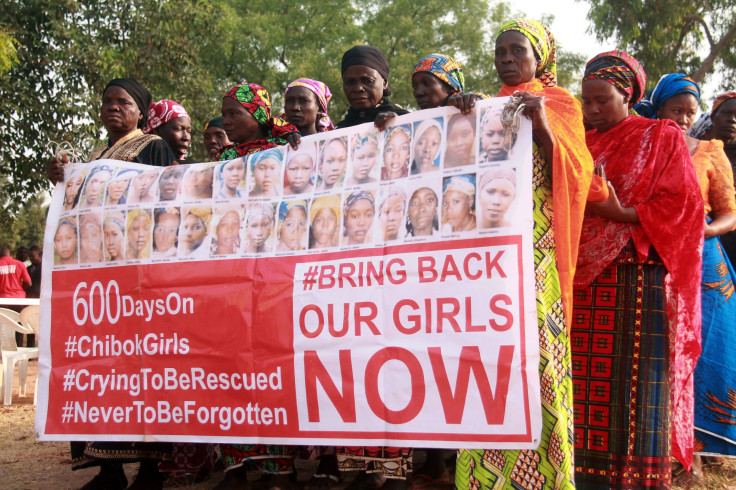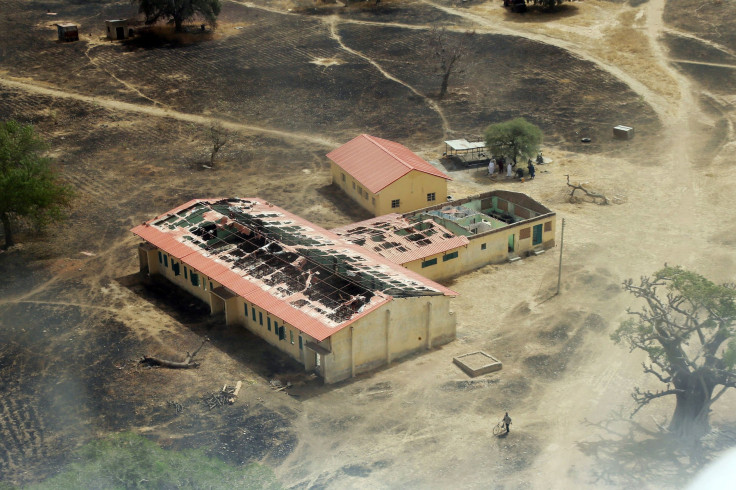Nigeria's Missing Chibok Schoolgirls Were Once Located By US, UK, But Rescue Mission Deemed Too Risky

UPDATED: 10:27 a.m. EDT — When asked to confirm or deny the report that the United States and the United Kingdom knew the location of some of the Nigerian schoolgirls kidnapped by the Boko Haram terrorist group in April 2014, Bill Strassberger, a spokesman for the U.S. State Department's Bureau of African Affairs, replied in a statement via email Monday:
“The United States continues to support actively the efforts to locate and bring home the Chibok girls along with other kidnapped victims of Boko Haram’s acts of terrorism. The search for the kidnapped schoolgirls is ongoing. While the Nigerian government maintains its lead role, the United States continues to lend its unique assets and capabilities to assist in the search.”
Original story:
Former British High Commissioner to Nigeria Andrew Pocock said Sunday the United States and the United Kingdom knew the whereabouts of at least 80 Chibok schoolgirls kidnapped by Boko Haram in northern Nigeria but failed to launch a rescue operation. In an interview with British newspaper the Sunday Times, Pocock revealed that the Western governments felt “powerless” to save the girls and young women.
Boko Haram militants descended on a boarding school in northeast Nigeria on the night of April 14, 2014. By morning, the extremist group had herded 276 schoolgirls into trucks and vanished behind the forest brush in the town of Chibok. Some of the girls have managed to escape on their own since then, but more than 200 are still missing, and government search efforts have been unsuccessful despite a global social media campaign and pleas from international leaders.
Pocock said British and American surveillance spotted a large group of the girls in the vast Sambisa forest in northern Nigeria shortly after their disappearance. But a rescue mission was deemed too risky.
“A couple of months after the kidnapping, flybys and an American eye in the sky spotted a group of up to 80 girls in a particular spot in the Sambisa forest, around a very large tree, called locally the Tree of Life, along with evidence of vehicular movement and a large encampment,” the former diplomat told the Sunday Times. “A land-based attack would have been seen coming miles away and the girls killed. An air-based rescue, such as flying in helicopters or Hercules, would have required large numbers and meant a significant risk to the rescuers and even more so to the girls.”
Pocock added: “You might have rescued a few, but many would have been killed. My personal fear was always about the girls not in that encampment — 80 were there, but 250 were taken, so the bulk were not there. What would have happened to them? You were damned if you do and damned if you don't.”

Nigerian President Muhammadu Buhari, who was not in office at the time of the abduction, admitted in December that his administration had no reliable information or intelligence on the whereabouts of the Chibok schoolgirls. Buhari, however, said the Nigerian government was willing and ready to negotiate with the terrorist group without any preconditions in order to retrieve the girls.
“The honest truth is that I don’t know the actual place and state of the girls. The more reason we are trying to be very careful before we negotiate with any group. Before we negotiate with any group, we must make sure they show us the actual location of the girls. We must make sure they are complete,” Buhari told a panel of journalists during his first presidential media chat in Nigeria’s capital of Abuja. “We are looking for a credible Boko Haram leadership that will convince us that the girls are here and alive.”
The former military ruler, who took office in late May, said rescuing the Chibok girls and securing the country were among his administration’s top priorities. He insisted his government has made some headway against Boko Haram, which has killed some 20,000 people and displaced more than 2 million since launching a brutal insurgency in northern Nigeria seven years ago.
"I assure you that some progress has been made on the ground," he said.
The girls’ plight garnered attention on Twitter using the hashtag #BringBackOurGirls. High-profile political figures such as first lady Michelle Obama, former Secretary of State Hillary Rodham Clinton and British Prime Minister David Cameron endorsed the social media campaign in 2014. But the conversation on social media never rendered political action, highlighting the disconnect between public support and political will that often arises in international conflict.
The Nigerian government only acknowledged the mass kidnapping at the Government Girls’ Secondary School in Chibok two weeks after the incident, when the missing girls began to make international headlines. Then-President Goodluck Jonathan made his first public comment three weeks after the abduction, promising to ensure the schoolgirls were freed from their Boko Haram captors, who had claimed responsibility.
“Give us some time over the Chibok girls," Jonathan said on a nationally televised program in 2014, according to Deutsche Welle, Germany's international broadcaster. "The story will be better in a few weeks.”
The story, however, is largely the same two years later. Most of the Chibok schoolgirls remain missing, and Boko Haram is continuing to devastate communities in northern Nigeria. The Nigerian government has claimed military successes against Boko Haram, but the Islamic militant group is now using hit-and-run tactics to carry out attacks on soft targets, like sending suicide bombers into crowded markets or raiding villages for resources. Boko Haram may no longer physically control large swaths of territory, but its insurgency has been thriving in the Sambisa forest and the mountainous border regions between Nigeria, Niger, Chad and Cameroon.
© Copyright IBTimes 2024. All rights reserved.





















